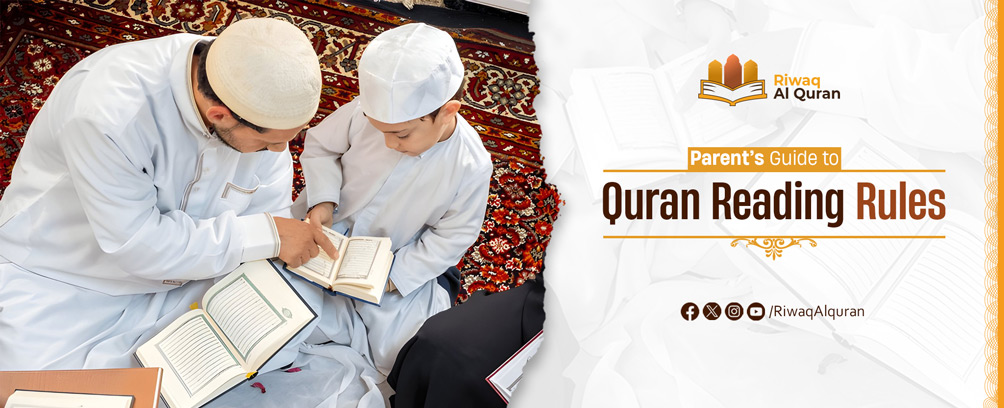The rules of reading the Quran are deeply intertwined with the manners and etiquettes of approaching this sacred text. Observing these etiquettes of reading the Quran transforms the act of recitation into a spiritual and respectful experience. Let’s learn the rules and things to do before reading the Quran!
In short: To read the Quran properly, one must follow key rules and etiquettes that ensure respect and correct recitation. Begin with physical and spiritual purification through wudu, and recite Istiaazah and Basmalah. Adhere to Tajweed rules for accurate pronunciation, observe Waqf for proper pauses, and maintain a melodious tone. Show reverence by sitting respectfully, holding the Quran in the right hand, and placing it in an elevated position. Avoid distractions like eating or talking, and focus entirely on the Quran’s meaning and guidance. Dressing modestly and reflecting on the verses deepen the spiritual connection while reciting.
Let’s discuss these in details:
Table of Contents
What To Do Before Reading The Quran?
Before reading the Quran, it’s essential to follow these steps for proper spiritual and physical preparation:
- Purify Yourself: Perform wudu (ablution) to ensure you are in a state of cleanliness, as the Quran should only be touched and recited in a pure state.
- Choose a Clean Place: Select a quiet and clean environment free from distractions to focus entirely on the Quran.
- Show Respect: Handle the Quran with care, and place it on an elevated and clean surface when not holding it.
- Face the Qiblah (Optional): If possible, face the direction of the Kaaba in Makkah for added spiritual focus.
- Seek Refuge and Begin with Bismillah: Recite “A’udhu Billahi Minash Shaitanir Rajim” (I seek refuge with Allah from the accursed devil) and then say “Bismillahir Rahmanir Rahim” (In the name of Allah, the Most Gracious, the Most Merciful) before starting.
- Make an Intention: Approach the Quran with a sincere heart and the intention to seek guidance, knowledge, and blessings from Allah.
Let’s break these down in details:
What Are the Quran Reading Rules and Manners?
The Holy Quran is special, unlike other books in the world, and must be treated as such. Typically, elders have a good idea about the manners and etiquette of reading it but the younger children must be taught patiently and thoroughly.
To help you in this process, we have compiled a comprehensive list of some practical manners of reading the Quran which you can follow yourself and teach children to follow as well. You may also need to ask the children to read the concepts themselves so they grasp them better!
Rules of Reading the Quran
The rules when reading the Quran encompass the required guidelines for reciting it correctly, ensuring that each letter and sound is articulated as it should be. These are often linked to Tajweed rules, which govern the pronunciation and flow of the recitation.
1. Correct Pronunciation
Each Arabic letter has a specific point of articulation in the mouth or throat, known as Makharij. Correct pronunciation ensures that each letter is clearly articulated, which is fundamental in Quranic recitation.
2. Following Tajweed Rules
Tajweed rules regulate the pronunciation and flow of recitation. This includes observing characteristics like heaviness and lightness of letters, proper elongation or Madd, and blending sounds where required, ensuring clarity and accuracy.
3. Observing Waqf
Waqf rules guide where to stop, pause, or continue in recitation to avoid changing the meaning of the verses. Knowing these stops helps in delivering the verses as they are intended to be understood. Check this out learn more about Waqf signs.
4. State of Ritual Purity or Wudu
The Quran must be handled only with clean hands, so performing wudu, or ablution beforehand, is essential. Besides attaining purity physically, wudu also enables one to attain spirituality and mental clarity.
5. Reciting with Proper Tone and Pacing
The Quran should be read in a moderate, melodious tone, not too fast or too slow, and with reflection on its meanings. Most beginners make the mistake of reading faster, assuming it will increase their fluency. However, reciting fast can lead to mistakes and a lack of contemplation.
Also read: How to read the Quran?


Manners and Etiquette of Reading the Quran
Listed below are some of the manners and etiquettes of reading the Quran. Most of them are not mandatory, it is just recommended to follow them help one fully absorb the spiritual significance and build a more meaningful relationship with the Quran.
1. Reflect on the Meaning of Verses
As you read, take time to reflect on the meanings and teachings within each verse. The Quran contains guidance for all aspects of life, and pondering over its wisdom allows you to gain a deeper understanding and apply its lessons to your life.
2. Sit in a Respectable Manner While Reading the Quran
Due to the fact that the Quranic text has been revealed from the Almighty Allah Himself, one should pay due admiration for it by sitting in a decent manner. Choose a considerate position while holding the Holy Quran in your hands, demonstrating the high opinion you have for our Sacred Book.
3. Put the Quran in an Elevated Position
The Holy Quran has a high status. This is why you must place it in a high place while learning to read it word by word or during recitation. Many people use a clean pillow for this purpose, which you can try if you do not own a wooden book rest specifically for reading the Quran.
4. Hold the Quran in Your Right Hand
When you hold the Quran, make sure to hold it in your right hand. The Prophet Muhammad (P.B.U.H) used his right hand while performing good work, so following his Sunnah is encouraged.
5. Recite Istiaazah and Basmalah
The first and foremost thing to do is recite Istiaazah and Basmalah before beginning to read the Quran. Here is the translation of them:
- Istiaazah: “I seek refuge with Allah from Satan, the Accursed.”
- Basmalah: “In the Name of Allah—the Most Compassionate, Most Merciful.”
6. Avoid Placing Anything on Top of the Quran
Treating the Quran with respect also means not placing any other books or objects on top of it. The Quran should be kept in a clean, elevated position, and nothing should ever be placed over it, as it symbolizes its high status among all books.
7. Avoid Eating or Drinking While Reading
While reading the Quran, avoid distractions such as eating or drinking. This ensures that your focus remains solely on the words of Allah. It is also a way to show respect for the Quran and keep yourself in a state of mindful worship.
8. Do Not Talk During Quran Recitation
Before reading the Quran, eliminate distractions that may disturb your focus, such as mobile phones or talking to others. Staying away from worldly affairs prevents influences from Satan and keeps your focus on Allah.
9. Fulfill Every Requirement of the Quran
Certain Quranic verses contain Sajdah marks that require the reader to prostrate upon reading them. It is recommended to perform this Sajdah immediately to avoid forgetting it later.
10. Praise Allah
Another fruitful point is to praise Allah Almighty, as He has guided you to read His Holy Book. Offering thanks and praise at the end of your recitation shows gratitude for the blessing of the Quran.
11. Dress Modestly While Reciting
Wearing modest, clean clothing is essential when reading the Quran, as it reflects respect for the words of Allah. Dressing appropriately helps maintain a reverent atmosphere, ensuring that you approach the Quran with humility and honor.
12. Recite with a Focused Heart
Intention is central when reading the Quran. Ensure your heart and mind are attentive, focusing solely on the words of Allah. Reading with a calm and focused heart enables you to connect more deeply with the verses and understand their significance.
Experience Riwaq Al Quran Classes
Watch real moments from our live sessions at Riwaq Al Quran and see how we bring learning to life. These clips highlight our interactive, student-focused approach designed to keep learners engaged, motivated, and actively involved in every step of their educational journey.
Easy Way to Learn to Read the Quran?
After discussing the manners and basic rules of reading the Quran, it is best worth mentioning tips and techniques that you can follow to learn to how to learn Quran easily:
1. Get a Dedicated Teacher
We would like to advise you to get help from a dedicated teacher because, at the end of the day, if you don’t have a teacher who is correcting you when you pronounce something wrong, then you are going to learn something wrong, whether it be the pronunciation of a single letter. Riwaq Al Quran provides such dedicated teachers who can guide you and correct your recitation accurately.
2. Do Not Overwhelm Yourself
If you are a non-native, it is important to know that you cannot learn to read the Quran fluently within 24 hours. It is a slow process, and what would really help you is creating levels and then accomplishing them one by one.
If you are not familiar with the pronunciations of the letters, then you may want to start with a course specifically designed for beginners. Once you have a strong grip on the letters and their sounds, you can begin reading slowly to avoid errors in the process.
3. Revise.. Revise.. Revise!
As we mentioned earlier, learning to read the Quran takes time. However, you can make yourself efficient by revising the letters and then the Ayah every day. By doing so, you will see a significant improvement in your reading ability within days.
4. Learn Tajweed Rules
Tajweed will help you pronounce the words properly. The Quran must be recited as it is written, and different words are pronounced using different parts of your mouth. If you follow the rules of Tajweed, you will be able to read the Quran more accurately.
5. Listen to Famous Reciters
Listening and imitating famous Quran reciters will make you proficient in reciting the Quran. Try to listen to Abdul Rahman Al Sudais, Mishary Rashid Al-Afasy, and Abdul Basit Abdus Samad.
6. Prepare Your Environment
Environment plays a key role in helping your brain memorize better. This is why it is essential to sit in a quiet place, so you do not get distracted by worldly matters. If you are learning through an online platform, make sure that your internet connection is reliable.
7. Engage With Your Teacher
One-on-one sessions are great for learning the Quran. You can interact with your teacher as much as you need and clear your concerns. The most important thing is that it helps you understand and keeps you focused. Moreover, your teacher can point out mistakes to remove the chances of errors. Riwaq Al Quran offers one-on-one sessions with dedicated teachers to provide personalized guidance and support.
8. Practice Regularly
Practice makes a man perfect. It is highly important to practice whatever you learn on a daily basis. You should also try reading to your teacher or any family member to make sure you are not making any mistakes.
Frequently Asked Questions
Listed below are some of the most frequently asked questions about reading the Quran and the manners of properly preserving and reciting it.
1. How can I learn to read the Quran fluently?
The best way to learn to read the Quran fluently is by practicing it as much as you can. In this regard, you should get help from a professional teacher, and revise your lessons in front of him/her on a daily basis.
2. What should I read before reading the Quran?
As we mentioned earlier in our guide, you should recite Istiaazah and Basmalah before beginning to read the Quran. We must do this to prevent Satan from deviating us from the way of light.
3. How long does it take to learn to read the Quran?
The time one might take to learn to read the Quran highly depends upon the age factor. Children below 10 years of age are likely to take around 2 years to be able to fluently read the Quran. On the other hand, elders will take much less time, as it only takes months for some people.


Why Students Love Learning with Riwaq Al Quran
Hear directly from our students about how Riwaq Al Quran Academy has transformed their connection with the Book of Allah. Their experiences reflect the dedication, care, and quality that guide every step of our teaching.
Learn Quran and Tajweed With Certified Tutors!
Riwaq Al Quran is a comprehensive online platform that offers personalized Quran, Arabic, and Islamic Studies Online classes for individuals of all ages and backgrounds. Our experienced instructors use a structured curriculum to cover Tajweed, Tafsir, and Memorization, providing easy and effective access to learning the Quran. We offer several courses such as:
- Online courses for kids.
- Online Quran classes for kids and adults.
- Online Arabic courses
- Online Ijazah courses
- Online Islamic Studies courses.
Conclusion
When reading the Quran, observing proper manners and etiquette is essential to honor its divine nature. These etiquettes show respect for the Quran and ensure a focused and spiritually uplifting experience. Feel free to contact us for more information on the topic. You can also view our previous blog posts in which we have discussed the subtopics in detail!


































